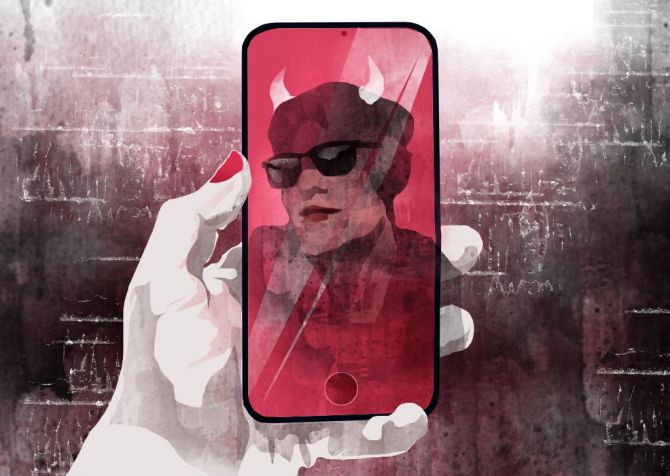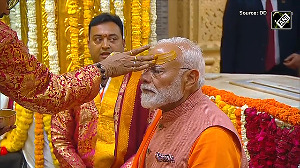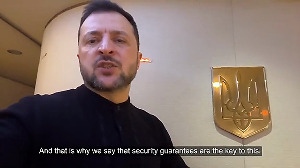Maintain a safe distance from people who are reluctant to share their real names or photos with you, advises Ravi Mittal, founder, Quack Quack, an online dating app.

We all do our best to avoid getting scammed in life.
We want to read all the documents before signing on them.
We like to verify all the ingredients of a food product before buying and consuming it and we absolutely do not want to sign up for a class that does not teach what they promise to.
Unfortunately, some of us can get scammed even while looking for a partner or our soulmate.
In fact, the dating world is much like our real world and even online, the phishing has its net spread all over.
People use dating apps for all sorts of reasons and some of them can be very conniving.
Here are some types of people you must absolutely avoid in order to make your online dating experience safer and fun:
1. Users with flashy bios
The purpose of dating apps is to present you with profiles that catch your attention, please your eyes, and most importantly, woo your heart.
To do that, the bio should be a witty and articulated description of your personality and who you are as a person.
It could be a funny quote by a celebrity or a Hindi film dialogue or some song lyrics that describe you the best.
However, for those of us who are lazy and do not bother to go the extra mile, we just copy and paste something from the Internet to sound clever (not really).
You will figure this out after going through a few profiles and coming across those same cliched lines over and over again.
You can easily call their bluff when you start chatting with them for real.
2. Bios with too many grammatical errors
You can let go of a typo here and there. But a scam profile will be loaded with them.
If you notice their sentence structure is not clear or there are too many language errors, these profiles can either be bots or real humans using a VPN and Google translate to type their bio and messages.
Today, almost anyone with a mobile phone can create an account online.
There are countless people with fake accounts looking for ways to trick and scam you.
Even if these are not real people, they could also be genuine bots, who could be testing you for data based research or study.
Nevertheless, you should be cautious and stay away.
3. Users with one liner bios
Bios with description that reads: 'Looking for something casual' or 'I am here to have some fun' or even 'I prefer chatting over writing bio' are clear red flags that you should avoid.
If they are looking for a connection or a relationship, they wouldn't be too sloppy about it.
If they didn't spend enough time to make a good profile, chances are, you could be dealing with someone who is irresponsible or generally careless about relationships.
What you should be looking for instead is a well formulated description of them in three sentences or more.
It could be funny, it could be not, but it will definitely show effort and incite you to send a message.
4. Users with borrowed or edited photos
A genuine profile would have quite a few photos of them doing different activities such as hanging out with friends in a club or playing with their pet at home or reading a book or just having fun on the beach.
A fake profile would rather have photos that are clearly stolen from the world wide web.
These could be pictures of popular or even lesser known models, actors, celebrities, etc. who are most likely to belong to a different country so that you don't suspect them.
When you ask them about their social media accounts or their real handle, they may even avert the question.
By all means, maintain a safe distance from people who are reluctant to share their real names or photos with you.
5. The one with half naked photos
This person is definitely seeking what you are not and they might as well say it clearly that they are just there for a 'no strings attached' relationship.
These users get on dating apps purely seeking physical pleasure and nothing more.
Most often, these profiles would neither have a bio, or a structured profile.
A person who is looking for a commitment would put in effort in selecting their pictures, polishing their bio and pondering over their interests.
So the next time you come across someone like this, you know what to do.
6. Users with group photos, blurry photos or photos of vague objects
Again, a low-effort profile will also have pictures of objects like a flower, nature or group photos where you will have you play 'find which one is me'.
Adding to the list are blurry photos that will scream 'Sir, can I have some more pixels, please?'
A scam profile will mostly feature a photograph where you won't be able to make out what the person looks like clearly.
7. Users who send dry, dull messages
You will find yourself begging for some water because their messages will be drier than the Sahara in summers.
One-word replies with absolute lack of interest (Uhm Hullo? Why are we continuing this conversation anyway?) is a clear sign the person is not interested or worth investing your time on.
You can throw all the open-ended questions in the world at them and their answers would still not go beyond 'Aha', 'Yeah', 'No'.
If you want them to show interest in talking to you (with a more extensive vocabulary), tell you about their day, and express a wider range of emotions then you have'll find yourself signed up for major disappointment.
You might as well ignore profiles such as these and move on.
8. Users with no personal information
This person will not, at any cost, tell you anything about themselves.
That is not to say you should doubt them because they did not immediately give you their home address to come over but that they do not entertain any questions about their personal life.
To elaborate this, take the example of their work life -- if after a few conversations, they do not tell you what they do or what they are looking for in a relationship, consider this as a red flag.
These people are probably too cautious or too tricky to get into a serious committed relationship.
9. Users who keep sending you links
It's not at all uncommon to bump into people who are on certain apps for business.
A person who sends you links to support their business or to buy their products is certainly not interested in dating you or even dating, in general.
They are only using the app to bring in some bucks and sell stuff to make money off you (sorry, but that's the truth).
These links might take you to their Web site where you can contribute to their wallet.
Someone might show you the preview of an exciting YouTube video or a funny meme, but when you click on the link, it might take you to a Web site where they can steal your personal information and details.
Whatever the situation, it's safe to not open any links sent by another user until you get to know each other better and a certain degree of trust is established between both of you.
Remember to tread very carefully so you have a pleasant dating experience.











 © 2025
© 2025